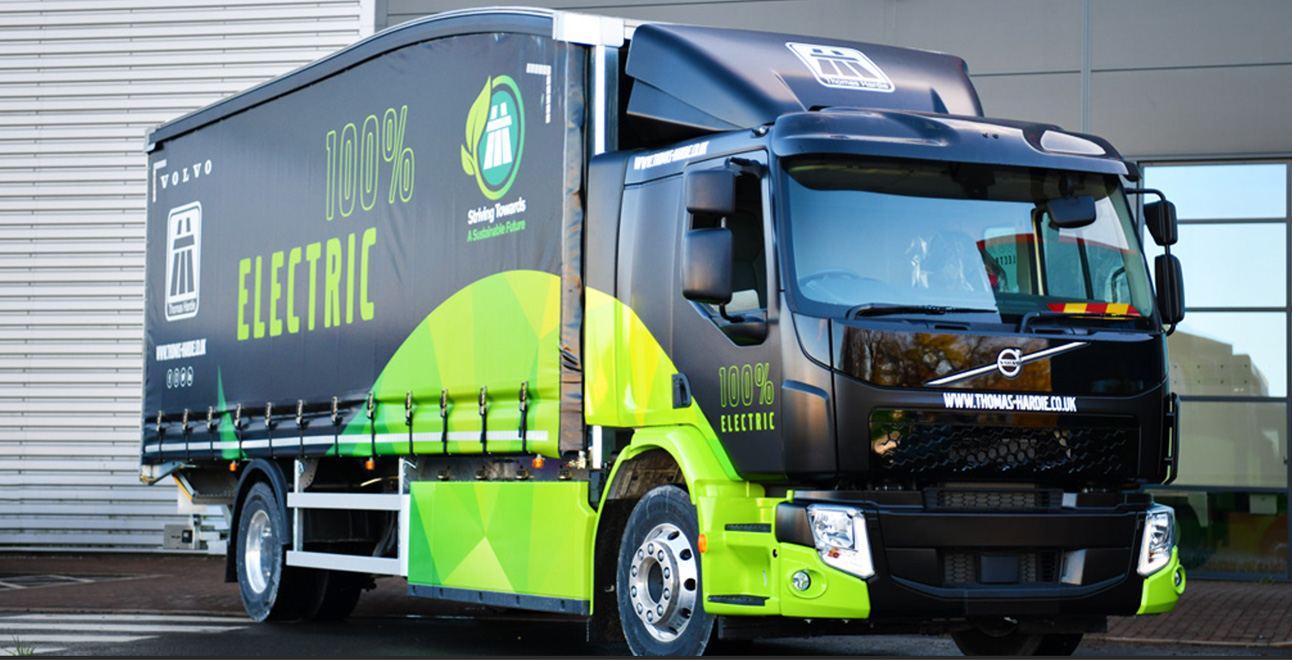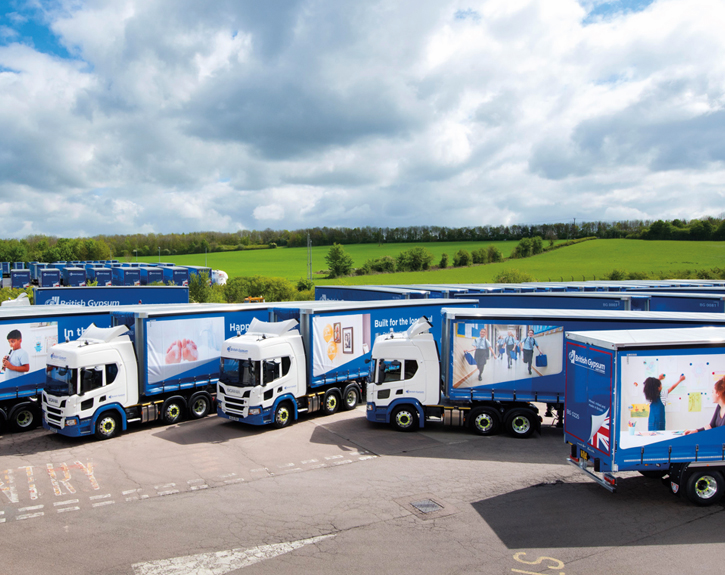The proliferation in electric vans points to an exciting near future in zero-emissions trucks for long distance haulage operators.
Updated January 2023, March 2022, April 29th 2021, July 12th 2021
This article is updated with landmark news in electric truck tractor unit development
January 2023 update
The new year was electrified from the off, with significant news from British electric vehicle manufacturer Tevva announcing that it has secured European Community Whole Vehicle Type Approval (ECWVTA) for its 7.5-tonne tractor unit. Tevva’s compliance achievements also include certification from the Swedish Transport Agency (STA). These milestone regulatory steps allow Tevva to commence volume production and sales throughout the UK and Europe, the firm having already manufactured but not yet delivered EV trucks and chassis for a number of household brands including Royal Mail, for whom the trucks’s 105kWh battery and 140-mile range will prove ideal in the contexts of urban delivery routes and last-mile operation. Towards the end of 2023, Tevva is set to introduce a 7.5t hydrogen-electric hybrid truck with range-extender technology to offer up to 350 miles.
March 2022 update
Parcel carrier, Amazon, introduced five DAF CF Electric tractors to its UK fulfilment centre fleets based out of Milton Keynes and Tilbury. The twin-axle trucks are powered by a 210kW electric motor and a 350kWh battery and offer a range of up to 155 miles, ideal for regional routes between DCs, especially when recharged by 360kW charge points as in Amazon’s case. Combined with a box van trailer, Amazon’s electric HGVs weigh in at a total of 37 tonnes GCW.
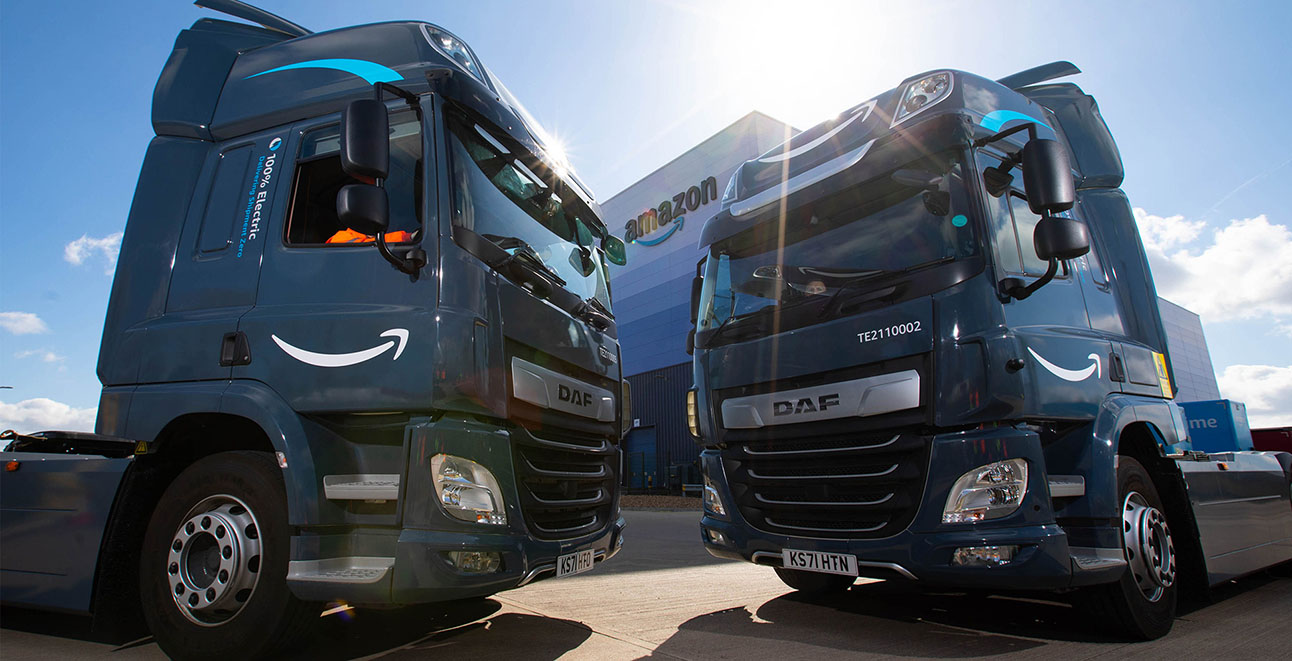
Over in the car world, hybrid and all-electric models are increasingly thriving while diesel is clearly on an irreversible slide, SMMT data for September 2020 identifying a 38% year-on-year retreat from diesel countered by a 166% upshot in the registration of electrified cars, which now account for a remarkable 10.5% share of the UK market1. The Coronavirus pandemic’s impact on commutes has admittedly accelerated the figures, but in any case the price disparity barrier that once impeded motorists from adopting alternatively-fuelled vehicles is fast dissipating, and research2 by investment bank UBS points to the additional costs associated with manufacturing electrified vehicles being wiped out by as soon as 2024.
The current makeup of the alternatively fuelled HGV market
Commercial vehicle operators, from gig economy van drivers through to thousand-strong HGV fleet operators, have perhaps unsurprisingly had to maintain their reliance on diesel for much longer, with a somewhat disappointing take-up of alternatives according to European Automobile Manufacturers Association (EAMA) figures3 citing diesel accounting for 97.9% of medium and heavy truck sales in 2019 while hybrid electric registered 0.1%, the same as petrol, plug-in variants managed 0.2%, and other alternative fuels including liquid petroleum gas (LPG), biofuels, ethanol and compressed natural gas (CNG) – with Ocado4 and Waitrose its most prominent fans – amassed to just 1.3% combined.
Clean air zones spark a surge in electric van development
In recent months, the electrification of vans and light rigid trucks has increased exponentially by both established OEMs and start-ups alike, no doubt welcomed by environmentalists and indeed everyday cyclists, pedestrians and others and likely timed to coincide with the introduction of clean air zones (CAZ) across the UK, such as mandatory schemes in Birmingham5 in June 2021, Bristol6 in March and, of course, London’s Ultra-Low Emissions Zone (ULEZ) that came info force in April 2019 and will be expanded further in 2021. In the capital, diesel vans up to 3.5 tonnes in gross vehicle weight along with rigids, heavy trucks and other large vehicles exceeding this tonnage must comply with Euro VI emissions standards or face a daily charge of between £12.50 and £100 depending on the class of vehicle.
Electric van7 pioneers such as the Nissan e-NV200 have been joined by the likes of Mercedes’ eVito and eSprinter, Volkswagen’s ABT eTransporter, the LDV EV80 and Iveco’s Daily Electric over the last twelve months, and indeed a raft of offerings from start-ups aiming primarily at the last-mile and urban markets, from Russian-British firm ARRIVAL’s electric vans8 for Royal Mail and UPS among others, to recently-announced vehicles like Amazon’s delivery vans built by Rivian9, and Swedish innovator Einride’s autonomous delivery van pods that have been tested on public roads and at DB Schenker’s sites10, pointing to an even more revolutionary future. While electrified vans will undeniably make urban areas quieter and cleaner, battery ranges and recharging times along with their currently higher purchase and leasing prices still bring certain limitations with them, but it’s a trend to be welcomed.
Electric rigid trucks
Of greater interest to Tiger Trailers and its customers, though, are the strides being made in the heavy rigid truck segment, partly because it was always going to be relatively more straightforward to electrify smaller commercial vehicles in order to meet their more modest payload and mileage requirements.

RENAULT D Z.E.
5300mm
Wheelbase (upto)
185kWh
Electric Motor
424Nm
Torque
186miles
Range (max)
Renault Trucks11 describes its new D Z.E. unit as ‘a milestone in the transformation of urban transport’ and the first 16-tonne variant of the French manufacturer’s all-electric truck will be introduced into service for Warburton’s, the largest bakery in the UK, complete with a tail-lift and rear side door to transport six zero-emissions tonnes of cargo in the London area. Water and waste sustainability company SUEZ, meanwhile, will be welcoming the first 26-tonne 6×2 D Wide Z.E. chassis cab electric truck to its fleet in Bristol – an apt move reflecting the city’s prominently green aspirations. Available in 4,400mm and longer 5,300mm wheelbases, the Renault Trucks D Z.E. is powered by a 185kW electric motor that produces peak torque of 424Nm combined with a lithium-ion battery of either 200 or 300kWh, translating into what the OEM cites as a real-world range12 of up to 186 miles. Carlsberg is also reported as having signed up to adopt Renault’s D Z.E. with an order of twenty units destined for its Swiss subsidiary brewery13.
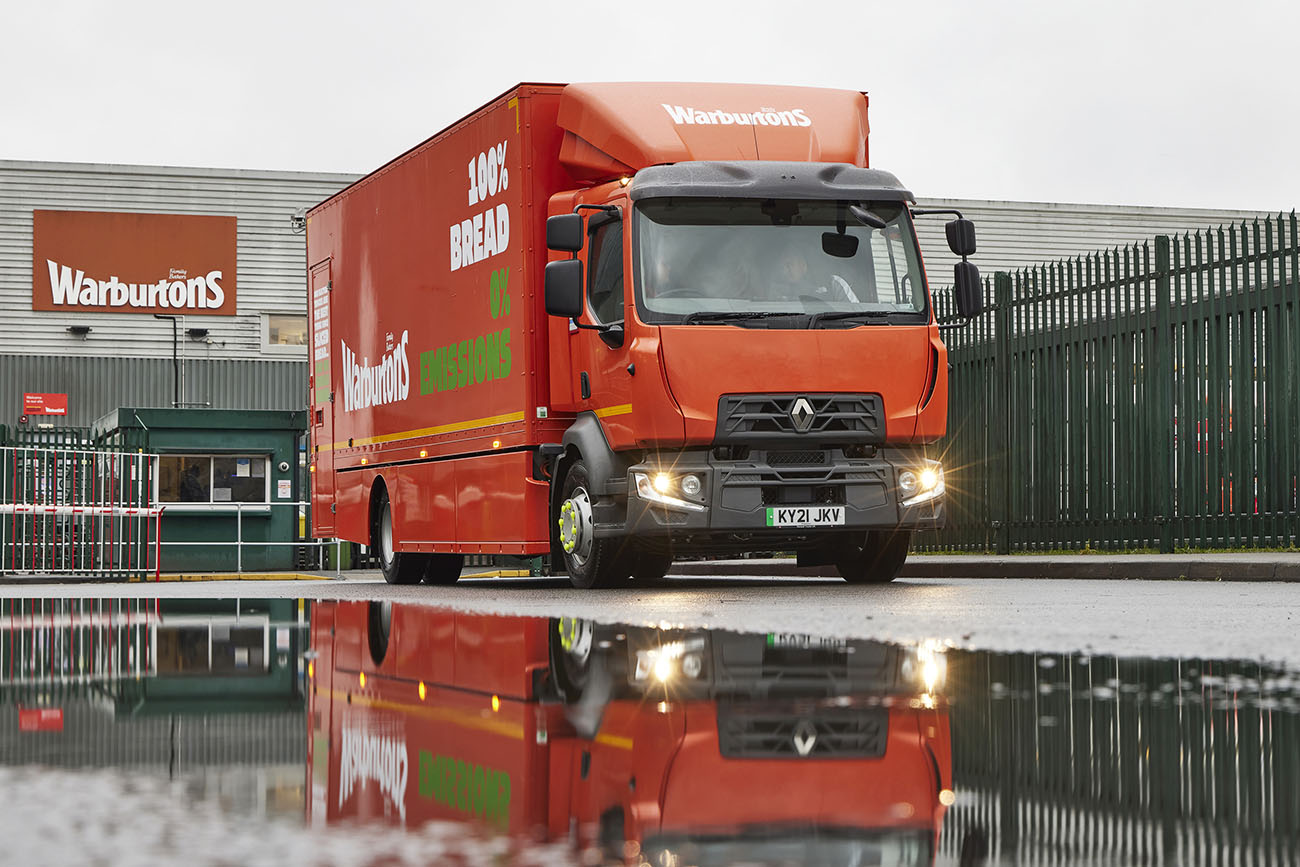
In late April 2021, baker Warburtons introduced to its fleet a fully electric 16t Renault D Z.E. rigid truck, sporting the witty slogan ‘Our electric trucks are the best thing since sliced bread’ and providing up to 150km (or 93 miles, as we like to put it) of zero-emissions delivery range. Serving its network of bakeries and retailers around London, Renault’s 4×2 rigid truck fitted out with a rear side door and tail-lift has the capacity for up to 6 tonnes of bread and other products and its near-silent characteristics are well suited to urban routes, especially when operating during the night. “The Renault Trucks D Z.E. answers today’s pressing need to improve air quality and reduce noise pollution in our cities. We are delighted that Warburtons has selected the D Z.E. to deliver even more sustainably for its customers, and that this first vehicle will confidently provide this service for the next ten years”, comments Renault Trucks UK & Ireland’s Managing Director, Carlos Rodrigues. A number of road transport operators will justifiably be asking questions about electric trucks’ reliability and manufacturer warranties, and the D Z.E. is covered by Renault Trucks’ Battery Performance Promise, guaranteeing that the battery will operate for up to 10 years or deliver 250 MW of energy over the rigid’s life.
Mercedes eActros
27-tonne
All-electric rigid cab/chassis
2022
Launched in
249miles
Electric mileage range (up to)
Mercedes, highly regarded for its HGV safety technology such as the Active Drive Assist and MirrorCam systems that Tiger Trailers’ lighting specialist customer Dextra Group has embraced, introduced its own 100% electric 27t tractor cab in 2022. With a battery mileage range of up to 249 miles, the eActros is available in two or three-axle models with various battery pack configurations.

Long-distance trucks – the ultimate aim
The pinnacle of commercial goods vehicle electrification, though, is unarguably in zero-emissions tractor units capable of pulling semi-trailers – an operation that typically entails considerable distances, fast turnaround times and substantial payloads, sometimes in environmental conditions that have a detrimental effect on battery range.
TESLA SEMI
60mph
Speed on 5% gradient
20 seconds
Acceleration to 100km/h (62mph)
0.
Drag Coefficient
500 miles
Electric Range (max)
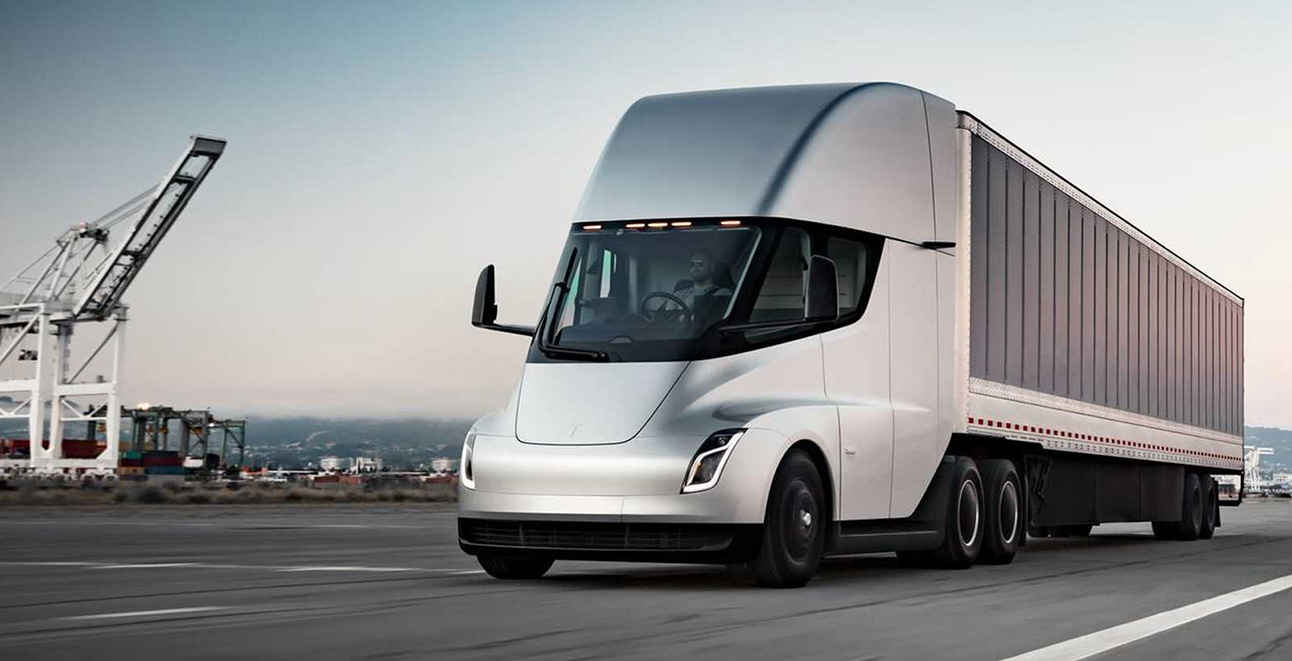
Tesla, in many ways the primary brand that springs to mind in the electric car segment, is very much in on semi-truck development, too, which for the American market means ‘class 8’ vehicles. While Tesla claims that the Semi is the safest and most comfortable truck ever produced, which will respectively pique the attention of fleet managers and the UK’s class 1 drivers, most others will primarily be interested in its performance figures. In the case of the firm’s cars, the credentials are usually nothing short of ludicrous – and the same remarkably applies to Tesla’s electric truck which, in their words, promises ‘badass performance’.
With four independent electric motors on the rear axles15, Tesla currently cites that its Semi will be capable of travelling at 60mph up a 5% gradient climb, which would certainly be an advantageous improvement over the 45mph that a diesel truck unit can typically manage when hauling a fully-laden trailer. With a 40-tonne payload attached to the back, Tesla reckons its electric truck will be able to accelerate to 60mph in 20 seconds. In comparison, Commercial Motor’s 2017 road and track testing16 of the Scania S500 Highline, admittedly a V6 producing 500bhp and 2,550Nm/lb ft torque rather than the marque’s latest V8 units, identified its acceleration time as 50.5 seconds with a combined weight of 35 tonnes on the back. Volvo17 puts its FH 460 I-Save 6×2 down as taking 51.4 seconds as of 2019, and the current V8 range from Scania, which is widely perceived as the most powerful on the market, is frequently reported as reaching such motorway and dual carriageway speeds in 25-to-28 seconds – relatively very impressive, but still short of what the greener Tesla claims it will be able to do. This is partly thanks to a totally flat floor, side flaps that adjust automatically to the profile of the trailer being towed behind, and to its bullet-shaped nose design bringing a drag coefficient of just 0.39cd compared to the 0.65-to-0.70cd that is typical for most of today’s boxy tractor cabs.
The benefits of electric trucks in road transport
Maintenance costs from electric truck units will also offer significant benefits over their diesel and AFV counterparts thanks to fewer mechanical parts, independent suspension, and ultra-effective regenerative braking systems that should result in pads infrequently or perhaps even never requiring replacement, to name just a few differences.
The base price of the 300-mile range variant of the Tesla Semi electric truck is currently listed as £110,000, with the 500-mile range edition with its heftier battery pack priced at £140,000 – making them both seemingly comparably favourable in front of transport managers, particularly when considering the financial, operational, environmental and even CSR and marketing advantages of zero-emissions haulage, with fuel costs of under 2 kWh per mile.
Criticisms and questions
Nothing is perfect, though, and the website TankTwo18, for instance, asserts that the ‘Tesla Semi isn’t revolutionising the trucking industry’, arguing that the required energy density and subsequent battery sizes and weights required will translate into significant payload impairments, the 500-mile version’s likely 8-tonne battery leaving room for only a 21-tonne payload in the equation. In purely payload terms, this is substantially less than the 29,500kg payload Tiger Trailers achieved for British Gypsum through its Lightweight Curtainsider. TankTwo believes that the laws of physics can be overcome and that the range anxiety disadvantage of electric trucks can be negated if recharging technologies and infrastructure can be refined to the point where lorries won’t need to sit idle for hours per day to refuel. TwoTank’s own products and solutions may admittedly be somewhat biased, but the base argument is sound and points to hydrogen as perhaps being more beneficial to pursue than electricity. The same is true in the car segment, but manufacturers with the exception of Hyundai and Toyota strangely and frustratingly have no appetite to pursue it.
Markus Lienkamp, chair of Automotive Engineering at Munich’s Technical University, has disputed European consortium Transport & Environment’s study and even told the CleanTechnica19 website that the Tesla Semi’s probably huge battery “is technically not easily feasible and it’s also pointless both economically and ecologically”, but only time will tell.
NIKOLA TRE
all-electric truck unit
720kWh
Battery Capacity
640bhp
Peak Power
300miles
Zero-emissions Range (to)
Monopolies are never desirable and, besides, it’s exciting that Tesla has electric truck rivals vying to go one better. In many ways, the most fascinating rival is Nikola, another U.S. start-up, whose flagship ‘One’ tractor cab boasts an impressive 1,000bhp, 2,000lb ft torque, a range of up to 750 miles and, most remarkably, a refuelling time of under 20 minutes. However, it’s a hybrid hydrogen-electric truck, just like its ‘Two’ sibling, being developed alongside Bosch. Nikola’s first product to actually reach the hands of customers, though, is currently reported20 as a battery electric vehicle (BEV) initially. Called ‘Tre’, it will be build in Germany at partner Iveco’s plant sometime in 2021 in 4×2 and 6×2 guises, with battery capacity of up to 720kWh and power of 640bhp. Based on the Iveco S-Way chassis, the Nikola Tre will offer an anticipated range of 300 miles, and prototypes21 are expected to appear perhaps as early as December 2020.

Mercedes-Benz eActros LongHaul
310miles
Expected Range
2024
Anticipated Arrival
With Nikola’s fortunes having experienced some twists and turns in recent months, largely surrounding its founder, and with no tangible all-electric or hydrogen-electric hybrid products having been delivered to customers yet despite years of development and hype, the most viable all-electric truck unit may prove to come from Mercedes’ stable in the form of the eActros LongHaul.
The holy grail of electric power in haulage has unarguably got to be achieving the same distances, payload capacities and refuelling times that HGVs currently involve, with the added environmental, cost and efficiency benefits of zero-emissions road transport. Mercedes22 believes that the eActros LongHaul’s expected range of 310 miles between refuels is acceptable for most logistics providers, arguing that European legislation currently mandates breaks of 45 minutes of more after every 4.5 hours or less of driving, which will afford the opportunity to recharge some of the vehicle’s battery. It’s obviously unclear how Brexit will affect such safety-focussed regulations, but Mercedes’ beautifully-designed truck certainly sounds promising, leaving fleet managers, technology and road transport fans and others eager to learn details of its payload and refuelling times between now and its hopeful arrival23 in 2024.
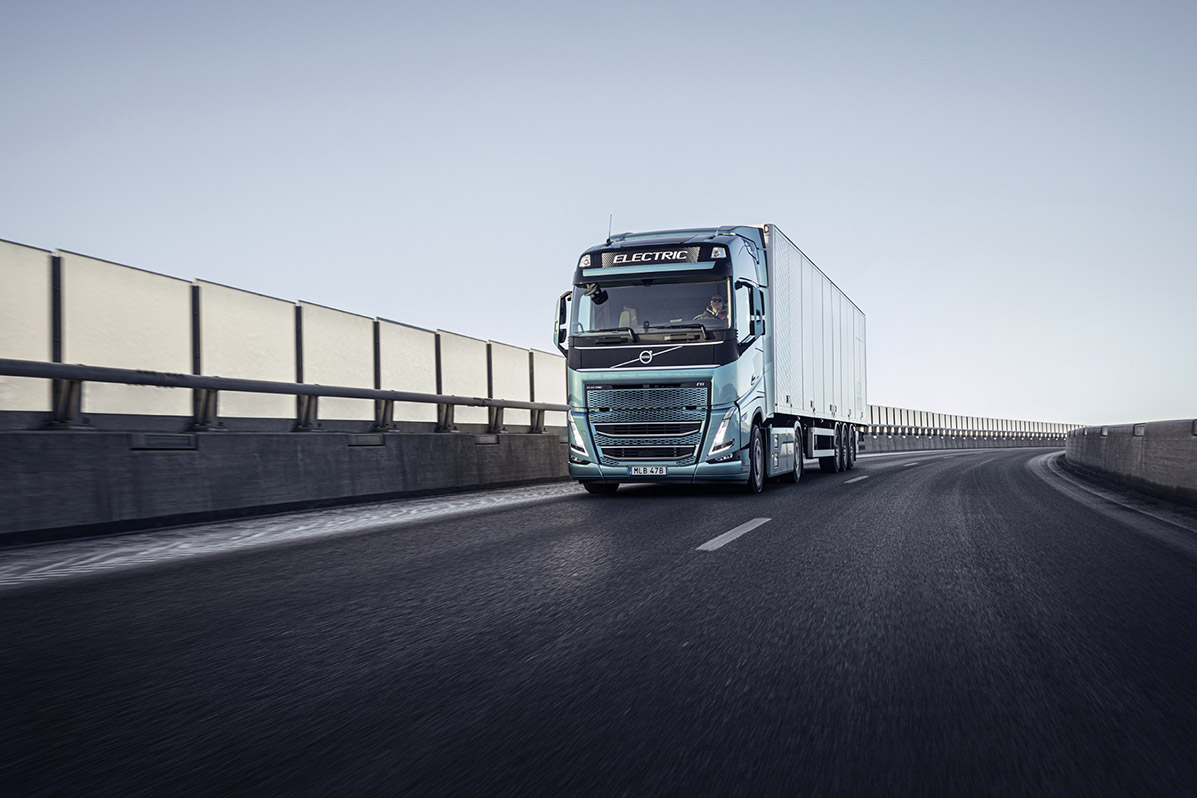
Volvo Trucks’ electric FM and FH Globetrotter XL tractors
Volvo Trucks’ solutions for long-distance hauliers are gaining momentum, too, with the manufacturer’s FH and FM models set to enter production in Europe in H2 2022 and join its existing short-distance zero emissions trucks for urban operators. Specs for Volvo’s FH and FM electric units are equally matched at 44-tonnes GCW, 490kw (666bhp) peak power, a battery ranges of up to 300km (186 miles), and mated to the marque’s I-Shift gearbox transmission. They are both offered in 4×2, 6×2 and 6×4 tractor cab or 4×2, 6×4, 8×2 and 8×4 rigid guises, their battery capacities range from 180 to 540kWh across two to six packs and they’re each compatible with DC fast-charging. The FM has a lower cab and is pitched at high-capacity grocery deliveries, crane hire and other zero-emissions operations in more urban areas, while the Volvo FH electric truck is aimed at inter-city road haulage and has an elevated Globetrotter XL cab.
Scania’s all-electric rigid trucks
300kWh
Battery Pack (largest)
150miles
Range (up to)
65minutes
Empty to full recharge

Scania24 has recently introduced its first purely electric rigid truck in L and P-Series guises with 165kWh and 300kWh battery packs, the latter enabling a modest but generally laudable range of 150-miles and a recharge time of just over an hour. These strides are just the start, with the popular truck manufacturer having pledged in the media that “in a few years’ time [it] will also introduce long-distance electric trucks adapted for fast-charging during drivers’ compulsory 45-minute rest periods.”
Hydrogen and CNG hybrid electric trucks from Toyota and Hyllion
Elsewhere in the green truck development race, Toyota, the world leader in hybrid car pioneering, and truck company Hino, are developing a hydrogen-electric class 8 semi25 for the American and Japanese markets. Fleet Transport26 magazine reports that the currently unnamed truck will be used to haul automotive parts, beer and parcels in on-road tests and verification trials in 2022, which is promising news although once again highlights the limitations of all-electric power within the constraints of physics, with hydrogen-electric hybrids likely to emerge as the popular compromise in alternatively-fuelled long-haul logistics and road transport.

Toyota Hino fuel cell zero emissions big rig Class 8 semi HGV truck
Texas-based heavy-duty green truck company, Hyliion, interestingly combines electric battery packs that are recharged on the move by compressed natural gas-powered (CNG) generator tanks, with an ethos of not wanting to reinvent the wheel and impede operators with frustrating recharging times. Hyliion’s e-axle, being developed for the class 8 semi truck market, is tipped to be able to be retrofitted into older trucks or incorporated into new ones during factory assembly, opening up wider possibilities27.
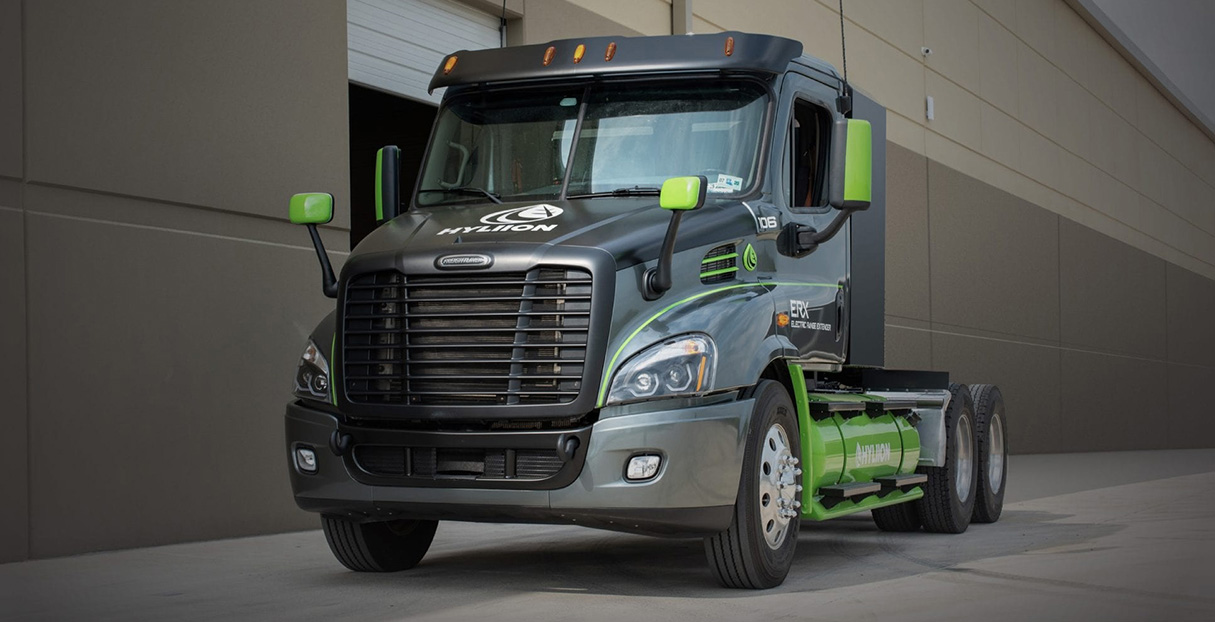
The exciting zero-emissions future of road transport
The focus in all-electric, long-distance trucking, then, appears to be on Mercedes and Tesla for the time being, but parallel strides in hydrogen-electric hybrid units and other alternative fuels are certainly to be embraced too. Electrifying long-haul tractor cabs and their sizeable trailers and payloads was always going to prove more challenging than manufacturing electric cars, for obvious physical reasons, but a determination definitely seems to be there among both established OEMs and start-ups alike.
Contributing around 5% towards CO2 emissions around the world, it’s clear that the logistics and transport sector needs modernising and cleaning up in vehicular terms, so it’s encouraging to see strides such as the EU’s target to reduce CO2 emissions among new truck units by a substantial 30% by 2030 – something the UK will hopefully mirror too despite the imminence of Brexit. Other moves such as banning diesel engines from certain major cities are revolutionising transport and communities alike, too.
McKinsey’s conclusion in its October 2020 white paper entitled ‘Why most eTrucks will choose overnight charging’28 that use cases for heavy-duty trucks with predictable, fixed routes of around 400km will emerge later is realistic, acknowledging such vehicles’ tough service routines. The report sensibly concedes that en-route charging stops will be entailed for the foreseeable future, which is a factor that procurement and fleet strategies will need to reflect, particularly those occasionally or regularly operating outside the UK.
On home soil, though, DfT ‘average length of haul’ statistics paint a favourable picture in terms of the electrification of rigids and articulated vehicles. In 1990, rigids of all sizes covered an average of 43 miles, which increased to 51 miles by 2010 and now stands at 59 miles. Articulated vehicles exceeding 33 tonnes, namely curtainsiders, box van and double deck trailers, made average journey lengths of 129 miles in 1990, 122 miles in 2010 and 136 miles according to 2019 data, meaning that HGVs haven’t undergone an increase in average haulage trips over the years, the statistics remaining relatively static. The all-electric and indeed hybrid HGVs already on the market and being launched over the next year or so would all comfortably accommodate the average length of haul without requiring a recharge en-route.
In June 2021, news from environmental pioneers Ricardo30 broke that they are developing technology aimed at electric vehicles, including trucks and trailers, charging their batteries dynamically, on the move out on the open road. In relation to the car sector, this kind of technology has been described as a Scalextric-like approach and we agree that it would certainly be a “game-changer” if it comes to fruition. Ricardo is developing its wireless electric HGV charging technology alongside partners including Cenex, Coventry City Council and Western Power Distribution (WPD), and it could well enable operators with long-distance routes to switch to electrified vehicles in the future, as the UK and other countries target decarbonisation as expediently as feasible.
Envisaging HGVs eventually being provided with charging facilities while loading and unloading at distribution centres, warehouses and similar is certainly plausible, but AC chargers are regrettably relatively slow, while DC fast-charging is more expensive. The study’s consideration of battery-swapping is an exciting possibility, negating recharge times completely, although battery costs themselves would pose a considerable investment for operators. It’s clear, then, that the TCO needs to be considered carefully by fleets contemplating going electric, but some logistics firms’ routes will suit electrification very well.
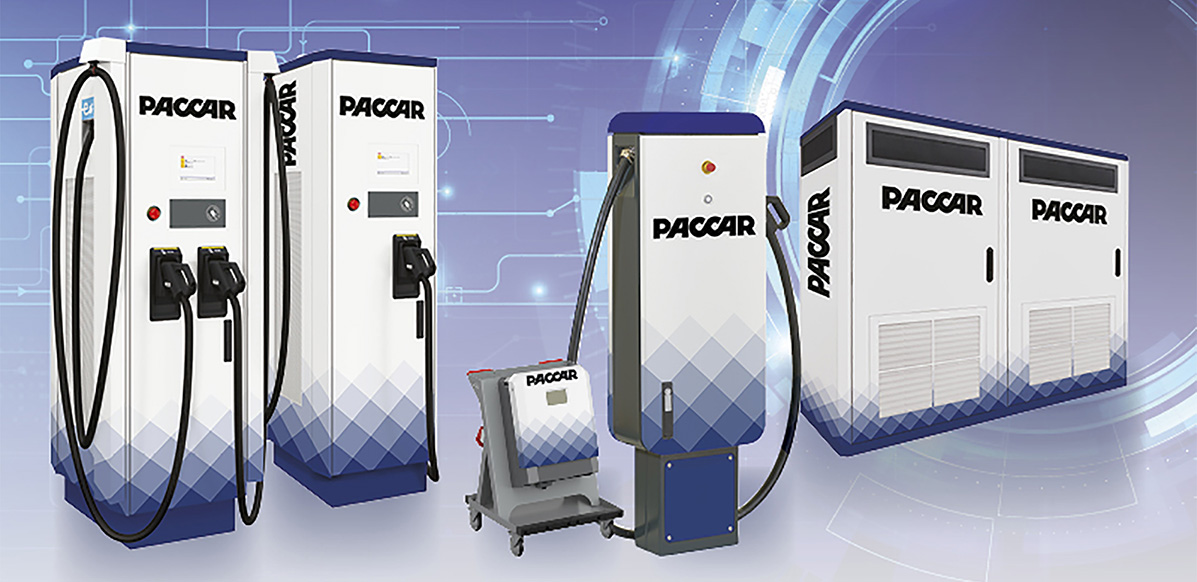
Encouragingly, DAF Trucks29, the Dutch manufacturer, announced in April 2021 that it is introducing PACCAR charge points for its LF Electric and CF Electric trucks, providing charging capabilities up to an ultra-fast 360kW, putting either a 2-hour full battery recharge time or the ability to fast-charge two electric trucks simultaneously, within reach of operators.
It will likely be a decade or more before refrigerated, temperature-controlled trailers are bestowed with all-electric or even hydrogen-electric hybrid truck powertrains owing to the extra demands of the refrigeration units, but the whole development race will make the next few years very interesting indeed for Tiger Trailers and its wide-ranging customers in haulage, logistics, parcel delivery and other sectors.
© Tiger Trailers, November 2020
Sources:
1. https://insideevs.com/news/447327/uk-record-plugin-electric-cars-september-2020/
2. https://www.theguardian.com/environment/2020/oct/21/electric-cars-as-cheap-to-manufacture-as-regular-models-by-2024
3. https://www.acea.be/press-releases/article/fuel-types-of-new-trucks-diesel-97.9-electric-0.2-hybrid-0.1-market-share-i
4. https://motortransport.co.uk/blog/2020/10/09/ocado-adds-to-cng-fleet-with-new-iveco-stralis-order/
5. https://www.bhf.org.uk/what-we-do/news-from-the-bhf/news-archive/2020/october/details-on-delayed-local-clean-air-zones-finally-announced
6. https://www.fleetnews.co.uk/fleet-faq/what-are-the-proposed-uk-clean-air-zones-caz
7. https://www.drivingelectric.com/news/622/new-electric-vans-2020-and-beyond
8. https://www.ft.com/content/667ce2be-42c0-11ea-a43a-c4b328d9061c
9. https://www.forbes.com/sites/greggardner/2020/10/08/amazon-offers-a-peek-of-rivian-designed-delivery-vans/
10. https://www.forbes.com/sites/sebastianblanco/2020/04/07/einrides-autonomous-pod-trucks-now-schlepping-around-sweden/#6671280563b7
11. http://www.renault-trucks.co.uk/news/renault-trucks-announces-sale-of-uk-s-first-100p100-electric-d-zetrucks.html
12. https://corporate.renault-trucks.com/en/press-releases/2018-06-26-renault-trucks-unveils-its-second-generation-of-electric-trucks.html
13. https://www.transportnews.co.uk/2020/03/05/electric-26t-renaults-for-carlsberg/
14. http://www.transportengineer.org.uk/transport-engineer-news/mercedes-benz-to-start-series-production-of-the-eactros-next-year/230688/
15. https://www.drivingelectric.com/tesla/1133/tesla-semi-truck-specs-price-and-sale-date
16. https://www.scania.com/content/dam/scanianoe/market/uk/experience-scania/Publications/commercialmotor-s500-roadtest.PDF
17. https://www.volvotrucks.co.uk/content/dam/volvo/volvo-trucks/markets/uk/homepage/CM%20Feature.pdf
18. https://www.tanktwo.com/why-tesla-semi-isnt-revolutionizing-the-trucking-industry/
19. https://cleantechnica.com/2020/02/18/auto-expert-says-tesla-semi-is-pointless-seems-to-miss-the-point/
20. https://www.electrive.com/2020/02/07/nikola-tre-to-be-built-in-ulm-germany/
21. https://www.autoevolution.com/news/nikola-tre-electric-truck-to-be-on-the-roads-by-end-of-2021-149514.html
22. https://insideevs.com/news/444493/mercedes-benz-eactros-longhaul-ready-2024/
23. https://www.reutersevents.com/supplychain/technology/daimler-premieres-new-green-trucks-eye-mass-production-second-half-decade
24. https://www.scania.com/uk/en/home/experience-scania/news-and-events/news/2020/09/scania-electric-truck-launches.html
25. forbes.com/sites/alanohnsman/2020/10/05/toyota-hino-plan-us-hydrogen-big-rig-as-upstart-nikola-tries-to-stay-on-course/
26. https://fleet.ie/toyota-hino-heavy-duty-fuel-cell-electric-truck-verification-tests-to-start-in-spring-2022/
27. forbes.com/sites/christopherhelman/2020/09/25/as-electric-truck-startup-hyliion-goes-public-founder-is-set-to-be-americas-youngest-self-made-billionaire/
28. https://www.mckinsey.com/industries/automotive-and-assembly/our-insights/why-most-etrucks-will-choose-overnight-charging
29. https://www.daf.com/en/news-and-media/news-articles/global/2021/q2/29-04-2021-daf-introduces-charging-stations-for-electric-vehicles
30. https://motortransport.co.uk/blog/2021/06/08/new-game-changing-wireless-technology-could-open-door-to-long-haul-electric-hgvs-says-ricardo/

